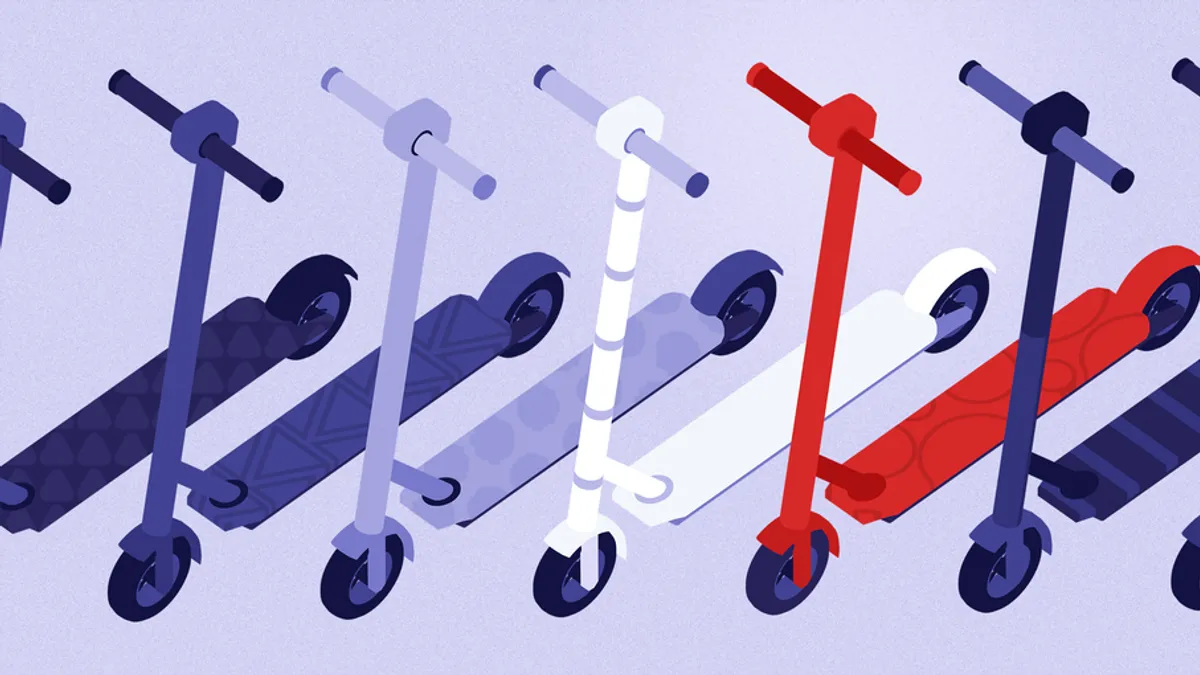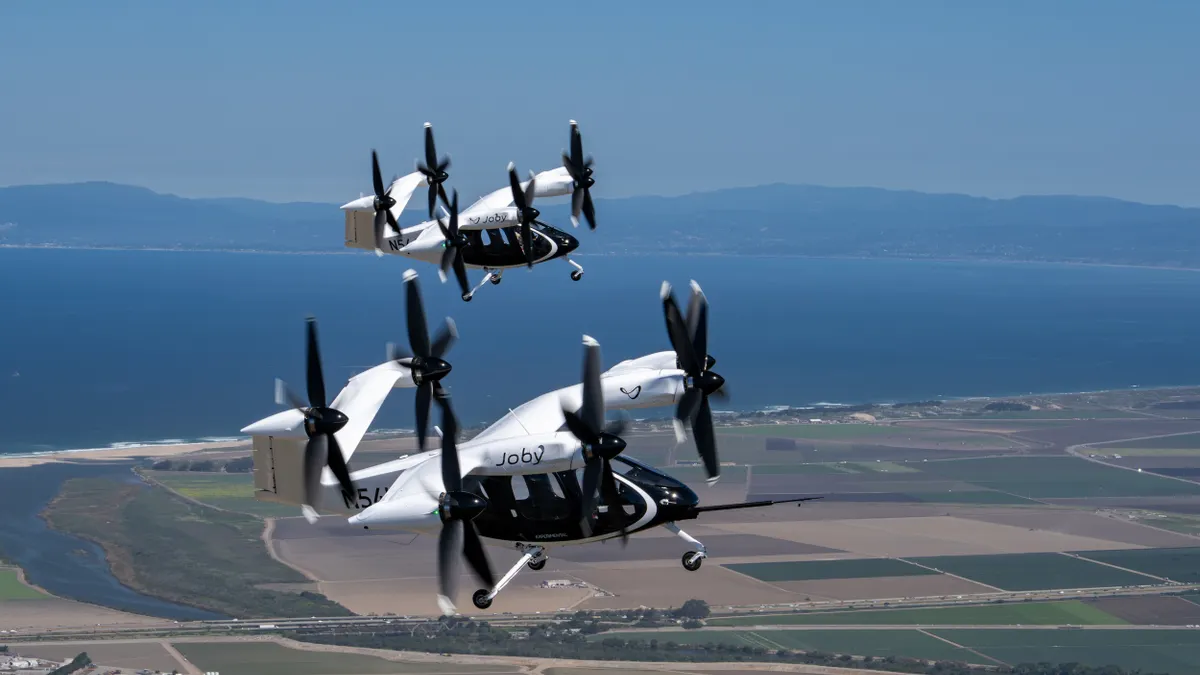Bird’s acquisition of Scoot earlier this year may signal a consolidation trend in the dockless e-scooter market as operators battle for supremacy on city streets.
Such deals could present scooter companies with opportunities to break into new cities and markets, while some experts said mergers and acquisitions (M&A) in the space could improve the quality of the products available to consumers. For cities, a smaller pool of operators could make regulating and keeping track of fleets easier.
While there are no concrete details on any upcoming acquisitions, the popularity of scooters has venture capitalists clamoring to invest more money in the trend as they keep a close eye on companies dominating the marketplace.
Bird spreads its wings
Heads turned when Bird bought Scoot for an undisclosed sum in June, the first such acquisition in North America. Previously, the only scooter acquisitions were made by large automobile-focused companies hoping to expand their mobility offerings, like when Ford bought Spin last November or when Uber acquired Jump the previous spring.
In a statement when the acquisition was announced, Bird and Scoot said the deal would "provide service in more communities," with Bird CEO Travis VanderZanden adding that it would help the two "further scale our complementary missions." Bird spokeswoman Rebecca Hahn declined to comment to Smart Cities Dive on whether the entry into San Francisco played a role in the acquisition, why the company made Scoot a subsidiary and if there are similar deals on the horizon.
The deal followed reports that Scoot was in financial trouble and struggling to gain a foothold in San Francisco. According to The Wall Street Journal, Scoot had a much lower valuation — $47 million — than its competitors but was finding itself in second place to Skip in the city, where just two operators were permitted.
Data released by the San Francisco Municipal Transportation Authority (SFMTA) showed that of the 242,398 scooter rides taken in the city from October 2018 until February 2019, only around 10% were with Scoot.
"The reality is, not that this is going to be a winner-take-all market, but there is not going to be enough room for all the companies to reach the scale that the backing they have received would essentially require."

Aaron Kellner
Director of Venture, SeedInvest
Roelof Opperman, an investor at Los Angeles-based Fifth Wall Ventures, which invested in Lime, told the Journal that the confluence of those factors meant Scoot was "shopping itself around" for a buyer. Opperman and Fifth Wall did not respond to Smart Cities Dive’s requests for further comment.
And while SFMTA recently announced it would allow other scooter companies to apply for a license to operate in the city, Bird’s purchase of Scoot represented a symbolic move into San Francisco. Investors noted its proximity to Silicon Valley, where many of the scooter companies got their start and are based. Scoot also offers electric mopeds, so the acquisition could help Bird explore new technology.
"It's not going to be as large as some of the other U.S. markets, but it's a critical market from a strategic perspective given that a lot of the major technology trends really start in San Francisco," Kyle Lui, a partner at DCM Ventures, which invested in Lime, told Smart Cities Dive. "It was a way for them to get in, but also I think it was a way for them to expand potentially beyond e-scooters and into mopeds as well, as that's really the area that Scoot really has had a key focus on historically."
Economies of scale
Bird’s acquisition of Scoot is not without precedent, and transactions in other parts of the world offer clues on why more may happen.
In January, Latin American scooter company Grin and Brazilian peer Yellow merged to create Grow Mobility. The move combined 135,000 dockless vehicles across six countries and brought a pledge to "more than double its fleet."
Acquisitions can help scooter companies expand their fleets and increase profits through economies of scale, with the potential for the companies to buy vehicles at a lower per-unit cost and simultaneously bring in more revenue from having more scooters on the streets.
"It's just the reality of economic models that these companies are based on that there does need to be a certain amount of scale that must be achieved in order to operate profitably," Aaron Kellner, director of venture at early Scoot backers SeedInvest, told Smart Cities Dive. "The reality is, not that this is going to be a winner-take-all market, but there is not going to be enough room for all the companies to reach the scale that the backing they have received would essentially require."
That is a key lesson from the explosion of dockless mobility in China. The market became saturated by innumerable companies offering such similar services that operators struggled economically due to small fleets and intense competition.
Chinese bike-share companies like Mobike and ofo tried to expand into the United States to grow their ridership and income but had to scale back their ambitions. Lui said the explosion in dockless bike-share companies in China came at the expense of sustainable economic models.
"What we really found is you really need to focus not just on scale but on unit economics," Lui said. "Those players really focused on land grabbing and scale without an eye on how they were going to get payback on the bikes that they had, which were considerably quite expensive."
If scooter companies scale up the size of their fleets through M&A, they can further improve their profit margins by investing in new technology and manufacturing that can increase scooter life spans. Those efforts can be aided by taking on the technical and development staff of the company acquired.
Impact on cities
A major point of debate among city leaders is how to best regulate dockless scooters. It can be difficult for cities to work with companies if they are relatively small and do not have the oversight to do self-enforcement. Kellner said the trend of larger companies buying up smaller competitors could make it easier from a regulatory point of view.
"If you want proper procedures and protocols, it's easier for that oversight to be implemented and monitored when you are looking at a handful or smaller number of larger companies and larger operations rather than myriad small operations that have a higher chance of flying under the radar," he said.
"What we really found is you really need to focus not just on scale but on unit economics."

Kyle Lui
Partner, DCM Ventures,
Lui also said that permitting fewer dockless providers could help cities build trust and increase understanding of the respective needs of each operator.
"I think there's lots of cities where they don't want to have 10 different operators and they want to pick two to three operators that they can trust and believe that they can go to, but at the same time giving consumers sufficient choice," Lui said. "I think in more local markets where some smaller players have been able to get strong footholds, they're probably ripe to be acquisition candidates at some point."
That possible dominance of two or three major players could mean mergers between similarly-sized companies, Kellner said, to potentially stop the dominance of big companies that could suffocate the rest of the competition.
While they may not have the capital or the size to reach into hundreds of cities like Bird and Lime, Kellner said having smaller players pool their resources could be a way to keep up in an increasingly competitive marketplace.
"There will be more merger and acquisition opportunities as the survivors and the winners either pick off the weaker rivals, or you might also see some of these smaller rivals try to band together in order to put on a stronger front," he said.



















